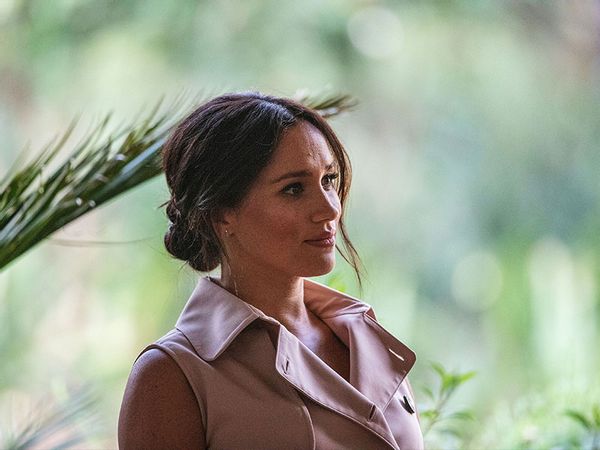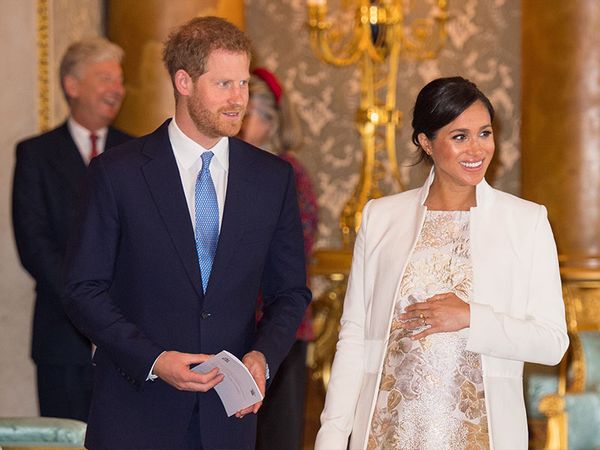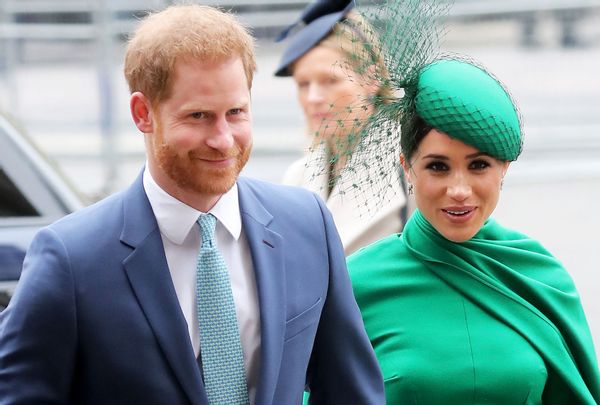
In the second half of "Harry & Meghan" we bear witness to the couple's session with a meditation coach. Sitting side by side on a couch, they breathe deeply and take in her wisdom.
"Remember that what is transpiring in the media, what is being created is an illusion," she says. "When you try to prove that you're good and that you're not the person they say you are, you're taking the bait, you're feeding the beast. It is an illusion. Your work is not to prove your goodness. You know who you are. Both of you."
Meghan breaks into tears at hearing this, because that coach is right.
On the other hand, the fact that we're watching this transpire on our TV screens proves they didn't take her advice.
A more empathetic view points out that would be impossible. If Prince Harry and Meghan Markle remained silent and let the institution that runs the royal family continue to lie about their character, their well-being would always be at the mercy of Buckingham Palace.
Hence, H & M are not merely feeding the beast, they're milking it. Good for them. Judging by the social media reaction to the series, along with Netflix-provided viewership data, this Jersey's got plenty to give.
The first three episodes enjoyed the best opening week of any of the streaming platform's documentary titles, logging 81.55 million hours of viewing worldwide. It was a Top 10 show in 85 countries and debuted as Netflix's No. 1 series in the U.K.
That doesn't mean everyone is rooting for them, but when does likability factor into deciding whether to watch a show like this? Not as often as you think. There are fans of "The Kardashians" who don't like the Kardashians. In that respect, it's best thought of as a real-life fairy tale told by the Sussexes and director Liz Garbus, featuring an imperfect prince and his bride who, by her own account, "tried so hard, and that's the piece that's so triggering because . . . it still wasn't good enough. And you still don't fit in."
Indeed. Nothing that the Duke and Duchess of Sussex do or say will change anyone's pre-existing opinions about them – and be assured, almost everybody has one.
They are extremely wealthy, and perhaps the highest-profile interracial couple in the United States and the U.K., if not on the planet. They are also in the unique position to throw open the doors of the British royal family's laundry room.
All of that places the couple in a position where even if they "win," as far as that can be measured by ratings, they lose. That they've made this series at all is offensive to die-hard royalists. Whether people believe what they have to say is another matter. Many will resent what they hold back, as if the couple promised to serve dirt on King Charles III and William, Prince of Wales, and Kate. For the record, they never did.
H & M aren't merely feeding the beast, they're milking it.
On the contrary, Meghan has nothing but kind words for Charles and the late Queen Elizabeth II. And that fuels the discourse related to Meghan's willingness to join a family intimately associated with colonialist exploitation and all of its associated suffering. The opening episodes of "Harry & Meghan" address that history, but that sharpness is somewhat blunted by the couple's assertion in these new episodes that she and Harry explain they were willing to continue doing their work of representing the Queen's interests after placing an ocean and most of Canada between them and the palace.
One popular argument posits Meghan, a Black woman proudly dedicating her life to social justice, should have refused to participate in such a morally questionable enterprise. Of course, this ignores the very human inclination to be loyal to a family into which she married, one that refused to extend similar loyalty to her.

Besides, to continue this debate, doesn't this play into the unreasonable expectation that this woman who leaped from co-starring in an American cable drama to marrying into a monarchy propped up by centuries of baggage, could somehow transform centuries of racial animus by her very presence?
It's all messy, and it all leads to the conclusion that "Harry & Meghan" was never going to give the public enough of the mess that it desires.
However, it is deft at interrogating the weight the public places on institutional validity and how that can be horrendously misused.
"Harry & Meghan" puts the couple's story to its highest use by examining the toxic influence powerful institutions like the British monarchy have on society and the dangerous alliance wrought by wielding that influence through the media. The United States is contending with its own version of that problem in the form of a pliant media's coziness with right-wing politicians and billionaires. The U.K. tabloid press is simply more brazenly irresponsible than most stateside publications and broadcasters – we should say, those that aren't owned by Sinclair or the Murdoch family.
Parallel to this, its look at the way Meghan is a lightning rod for social media hatred is particularly compelling. Her case aligns with verified data concerning marginalized people being the main targets of online abuse and violent threats. Harry may sound hyperbolic when he calls social media bullying a humanitarian crisis, but once Bot Sentinel founder and CEO Christopher Bouzy breaks it down, you realize he's not so far off.
Bot Sentinel is a non-partisan enterprise dedicated to combatting disinformation and targeted harassment by monitoring accounts for signs of trolling and inauthentic accounts. In the series, Bouzy declares that the online coordination dedicated to stirring up hatred for the couple is unlike anything his company has ever seen.

The couple's natural reaction to this can't help coming across as anything but personal, since these trolling efforts helped to escalate the death threats Meghan received. "You are making people want to kill me. It's not just a tabloid. It's not just some story. You are making me scared," she says through tears. "And you've created it for what? Because you're bored or because it sells your papers or it makes you feel better about your own life? It's real, what you're doing. And that's the piece I don't think people fully understand."
Author Safiya Noble seconds this by saying, "Let's be clear about what's actually at stake here: It's like symbolic annihilation. If you can destroy people who are symbols of social justice, then you can scare people to not want to be public. It is a way to signal to the rest of us to stand down."
Even viewers who disagree with that characterization of Meghan as a symbol of justice can't deny the genuine paranoia and despair she and Harry must have felt in knowing that amid this coordinated hate campaign, Buckingham Palace announced it was withdrawing their security.
Harry and Meghan are in a position where even if they "win," they lose.
Footage of the paparazzi circling their temporary home in Canada and strangers lurking just beyond their property provides some idea of how terrifyingly uncertain that experience must have been . . . until media mogul Tyler Perry swooped in and whisked them to safety. Thus, the uplifting resolution of the fairy tale resumes with what we know. First came relative privacy, then came Oprah. The revelation that Perry, who hadn't met the couple before abetting their escape to California, is Lillibet's godfather, is a pleasant epilogue too.
In this way and others "Harry & Meghan" plays out the difference between a journalistic documentary endeavor and portraiture. There's nothing wrong with that second approach, although the average viewer doesn't recognize the nuances separating one from the other. As such, one reason people question Meghan's historical and social naivete concerning the institution she and her husband would have continued representing is that Garbus isn't shown asking them about it.
A similar reaction may meet Harry's account of what occurred at the famous Sandringham family meeting, where he sought to hammer out an agreement about his and Meghan's role before they permanently stepped down. Then again, those circumstances are depressingly recognizable to anyone dealing with a dysfunctional family. Here was Harry, hoping to spend time with his grandmother, only to be denied that chance. Instead, he was made to face down his disapproving father and brother with no support.
"It was terrifying to have my brother scream and shout at me and my father say things that simply weren't true," he recalls, "and my grandmother, you know, quietly sit there and take it all in."
Afterward, the palace's public relations team quashed a story about the wedge between him and William, adding his name without asking his permission. "Within four hours they were happy to lie to protect my brother. And yet for three years, they were never willing to tell the truth to protect us. So there was no other option at this point. I said, 'We need to get out of here.'"

And yet, as Garbus records the couple in the days that follow their CBS interview with Oprah, we see that William has texted Harry a message. What the text says or what it means for the future of their relationship is never specified; we simply see Meghan embrace Harry, who says he must think about what to do with it.
Is that a missed opportunity on Garbus' part or an intentional omission to honor her subjects' privacy? We can only guess and choose whether to respect that choice, all of which depends on how we feel about these two. Professional loudmouths like Howard Stern may write off their account as whiny; Harry describes his last few years "like living through a soap opera where everyone else views you as entertainment."
Regardless, in making the series a combination of confessional and edifying, essentially doing exactly what their meditation specialist advised them against, Harry and Meghan's love story gets in the way of the valuable conversations "Harry & Meghan" seeks to have. That probably won't matter much in the long run. This is only the beginning of what they have to say.
All episodes of "Harry & Meghan" are streaming on Netflix.







